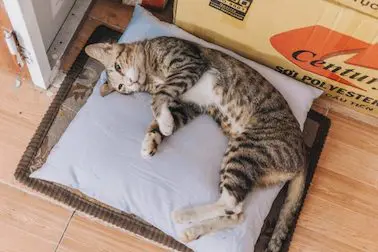About us:
Toxoplasma gondii is a parasite that infects many animals. In the US, 18–80% of cats and 17–29% of humans are infected. Cats play a unique role in its spread, as the parasite’s sexual reproduction can only occur in cats.
Most infected animals remain healthy. However, infections in immunocompromised individuals or fetuses can be deadly. So, it is important to understand the role of cats in spreading the parasite.
Curiously, the parasite alters the behavior of otherwise healthy rats: Toxoplasma gondii infection affects the innate-fear response in rats and induces a fatal sexual attraction toward the scent of cat to make them more easily captured as prey by cats. This influences how the parasite spreads between rats and cats.
Our research wants to address whether the parasite also alters a cat’s behavior to influence how the parasite spreads between cats.
Our research enlists the help of owners of indoor and indoor-outdoor house cats. About 30% of pet cats are infected with the parasite already. By studying a large group of pet cats, we won’t need to infect any cat with the parasite.
Since knowledge of the parasite influence pet-owner practices, we will also work with cat owners to identify misconceptions about T. gondii infection and develop strategies to reduce infection in domestic cats.
Overall, our work aims understand whether chronic infection affects a cat’s well being.


You don’t own a cat? No problem!
You can still help in this research by taking a brief survey (13 questions) about Toxoplasmosis that is available for both cat owners and non-owners.
Courtesy of Daniel Fishel. Do Cats Really Make People Go Crazy?, August 8, 2016.
Ongoing Studies:
bring your cat to our cat-behavior lab at uno
We will ask you to bring your cat to the campus of the University of Nebraska at Omaha where we will study its behavior. We will observe and record your cat's behavior after it wanders within a room with scented materials. During this assessment, you will be able to watch your cat's response using a live video feed in some trials and interact with it in other trials.
use our lightweight smart-gps device
We will track where your cat goes when it leaves your house. We will show you how to place a lightweight tracking device on your cat's collar to record its behavior. We also will show you how to download the data the device records and see it yourself. You will be able to view where your cat goes by looking at this data.
Play fun scientific experiments With your cat at home
We will ask you to record some features of your cat's behavior in your house. We will arrange for you to have access to online questionnaires to help you record some of your cat's behavior. We will also ask you to make video recordings of your cat's behavior with your smartphone or a camera we provide and then upload them to our website.
receive a profile of your cat's personality
We will ask you to answer a series of questions about your cat that will help us understand your cat's personality.
take a survey about toxoplasma gondii
We will ask you to complete 13 questions in this online survey to evaluate your understanding of cat Toxoplasmosis. It will take you approximately 10 minutes to complete.
Enter your email and we will contact you.
If you want to learn more about the eligibility criteria of participating in any component of this study, click on the link below.







